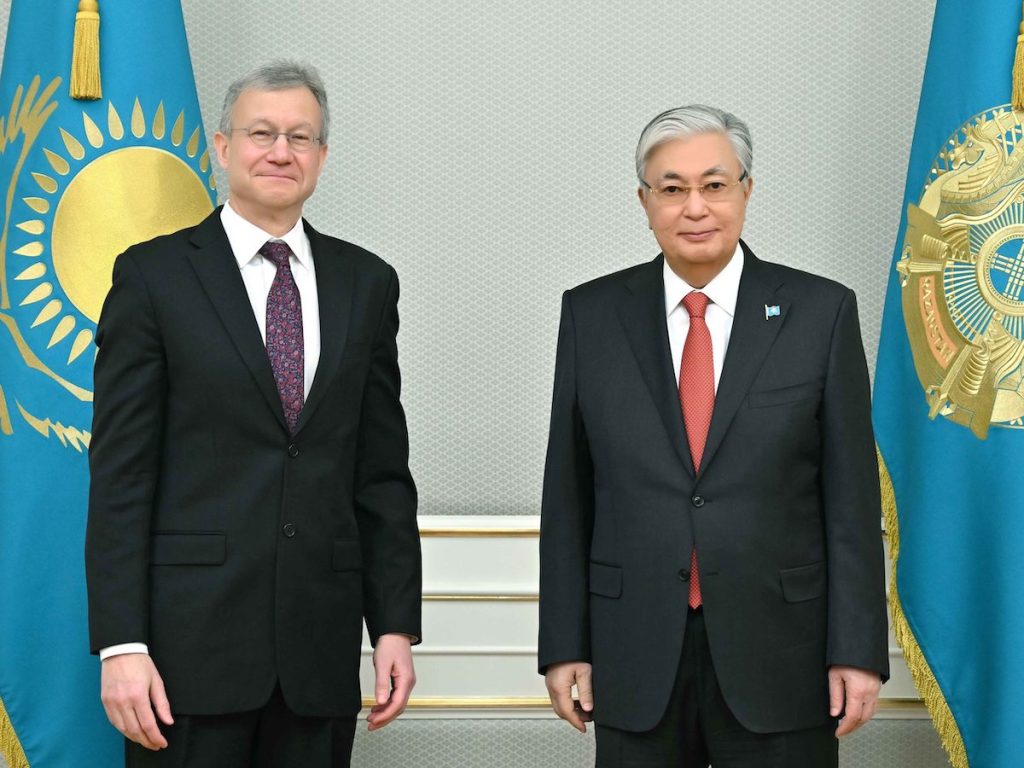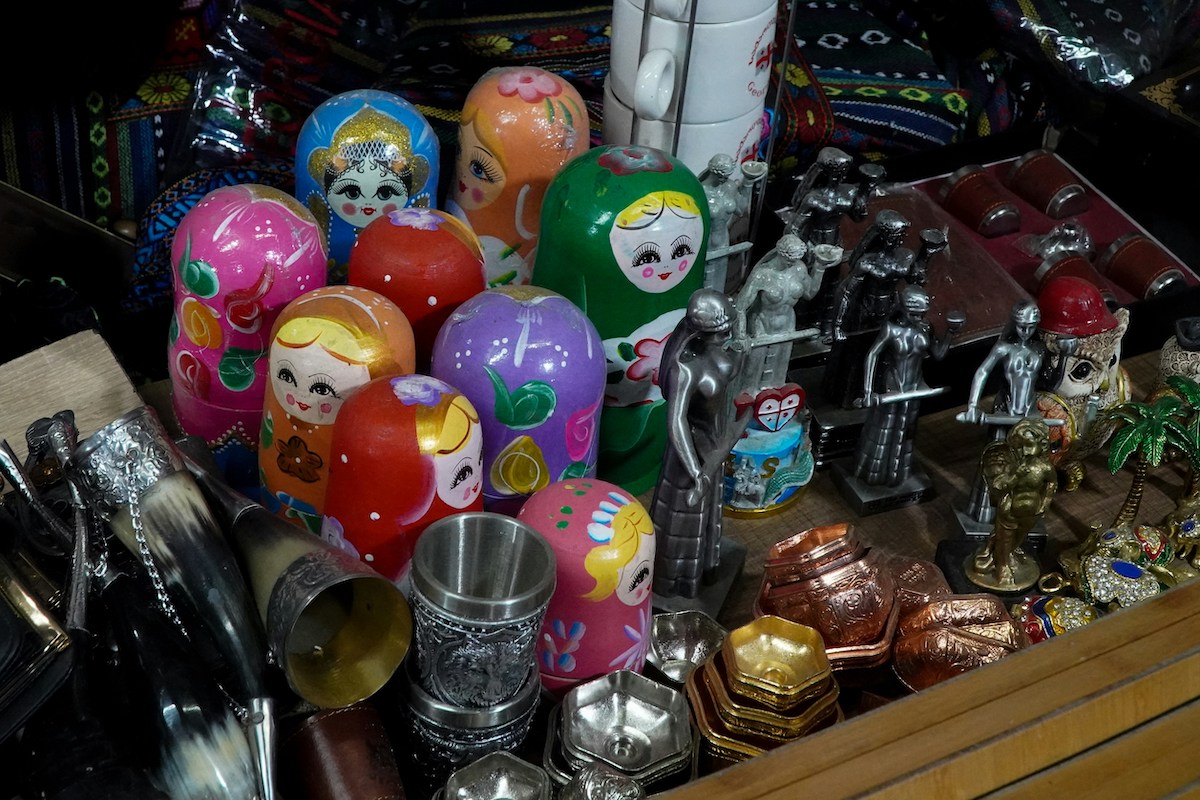Countries of Central Asia and Russian sanctions: how do they manage walking a fine line?
Russian sanctions and Central Asian countries
Kazakhstan and Kyrgyzstan tread a narrow geopolitical tightrope when it comes to international sanctions against Russia, striving to please both the Kremlin and the West. Kazakhstan appears to handle this task better than Kyrgyzstan.
Material prepared by JAMnews partner – Anhor.uz

In recent months, the leaders of Kazakhstan and Kyrgyzstan have engaged in rhetorical acrobatics aimed at maintaining good relations with all parties involved in the war in Ukraine.
For example, during a visit to Germany in late autumn, President Kasym-Jomart Tokayev of Kazakhstan reiterated previous denials that Kazakhstan had facilitated Russian schemes of parallel imports and sanctions evasion, insisting that Astana “clearly stated it would adhere to the sanctions regime.” At the same time, Tokayev stated that Kazakhstan is not “anti-Russian” and values “comprehensive cooperation with Russia, with which Kazakhstan shares the longest border in the world.”
President of Kyrgyzstan Sadyr Japarov also rejected the US accusations that his country violates sanctions. “There is no reason to believe so,” he said in his comment published by the state news agency “Kabar.” “Russia and China are not dependent on small Kyrgyzstan.”
These official denials are undermined by growing evidence of dubious trading practices. A potential indicator of sanctions-breaching behavior is the rapid growth in trade volume in 2022. Last year, Kazakhstan’s exports to Russia increased by 25 percent, while Kyrgyzstan’s exports grew by 150 percent compared to the previous year.
Numerous cases of suspicious trading have been documented. One notable example is an article in The Washington Post exposing a scheme by a Kyrgyz company attempting to act as a channel for delivering Chinese drones to Russia.
An investigation by Radio Azattyk revealed how Kyrgyz and Kazakh companies export microchips, telecommunications equipment, and other electronic components to Russia. Such components are similar to those used in Russian weaponry deployed in Ukraine. Additionally, an investigation by OCCRP shows that drones and microchips, allegedly used by Russian military, enter Russia through Kazakh companies.
Even Kazakh officials have acknowledged that some dual-use goods end up in Russia through Kazakhstan.
At first glance, the task of pleasing both the West and Russia for a long time seems difficult, if not impossible. Referring to Tokayev’s promises that Kazakhstan adheres to the sanctions regime while remaining a loyal economic ally of Russia, Rahimbek Abdrakhmanov, director of the Kazakhstan School of applied policy, says these concepts are mutually exclusive.
“These two promises negate each other; Kazakhstan cannot simultaneously adhere to the sanctions regime and maintain good relations with Russia,” says Abdrakhmanov.
Despite abundant evidence that both Kazakhstan and Kyrgyzstan violate the sanctions regime against Russia, only Kyrgyzstan has come under Western pressure. Five Kyrgyz companies have been sanctioned for aiding Russian military operations.
One explanation for the discrepancies is related to image-building. Kazakhstan has taken measures that look good, even if they do not work optimally. For example, to control the flow of sanctioned goods, Astana launched an automated online tracking system, which purportedly allows tracking of goods imported into Kazakhstan and their further movement. This was presented as a solution to stem the flow of sanctioned goods.
However, Kazakh investigative journalists express doubts about the system’s effectiveness. According to Dimash Alzhanov, a political analyst from Kazakhstan, items used in the Russian defense industry are exported by companies capable of circumventing the tracking system.
Whether effective or not, Kazakh officials have done noticeably more than their Kyrgyz counterparts to satisfy Western demands. Highlighting Bishkek’s tepid response, the head of Kyrgyzstan’s national security service, Kamchybek Tashiev, announced an investigation when Kyrgyz companies came under sanctions in July. Nearly six months after this statement, the investigation has yielded no results.
Meanwhile, in June, Kyrgyzstan’s national statistical committee changed the format of presenting open data on foreign trade, which some Western observers considered an attempt to conceal monitoring results. Instead of breaking down exported goods into specific categories using a 10-digit code, the agency began using four-digit codes, each covering a much broader range of goods. Agency representative Gulnara Sulaimanova explained this step by saying that “the need for [ten-digit codes] is not so important for users.”
Iskander Sharsheev, a Kyrgyz economist, confirmed that the change in coding has made trade monitoring more complex: “Now, since data on imports and exports are not disclosed, we cannot say whether sanctioned products are entering Russia through Kyrgyzstan.”
Additionally, according to regional experts, Kazakhstan is much more skillful than Kyrgyzstan in demonstrating readiness to withstand pressure from Russia while gaining diplomatic points with the West. Such an advantage is entirely understandable, some add, considering that Tokayev rose to the top of Kazakhstan’s politics through the country’s diplomatic service.
Among examples of Kazakhstan’s diplomatic finesse is Tokayev’s statement in June that his country does not recognize the independence of the self-proclaimed Ukrainian regions of Luhansk and Donetsk. In November, after a Kazakh-Russian meeting, Tokayev teased the Russian delegation led by Vladimir Putin by greeting them at a joint press conference in Kazakh.
“Kazakhstan has painted a beautiful picture,” says Abdrakhmanov, explaining how Kazakh legal and physical entities have so far managed to avoid sanctions. Alzhanov also noted that Astana maintains open channels of communication with Western analytical centers, media, and other Washington political circles.
Global economic factors also help Kazakhstan reduce Western dissatisfaction with the lifting of sanctions. Kazakhstan’s oil and gas resources attract significant investments; six of the top 10 investors in this sector are companies headquartered in the EU, UK, and US. Kyrgyzstan, on the other hand, lacks natural resources and is not a hub for intercontinental trade.
“They [Kyrgyzstan] set us as an example because Western business is not represented here. We are small,” says Sharsheev, a Kyrgyz economist. “The safest [for the West] is to put pressure on our country because it cannot do anything in response.“
Author: Nurbek Bekmurzaev




















